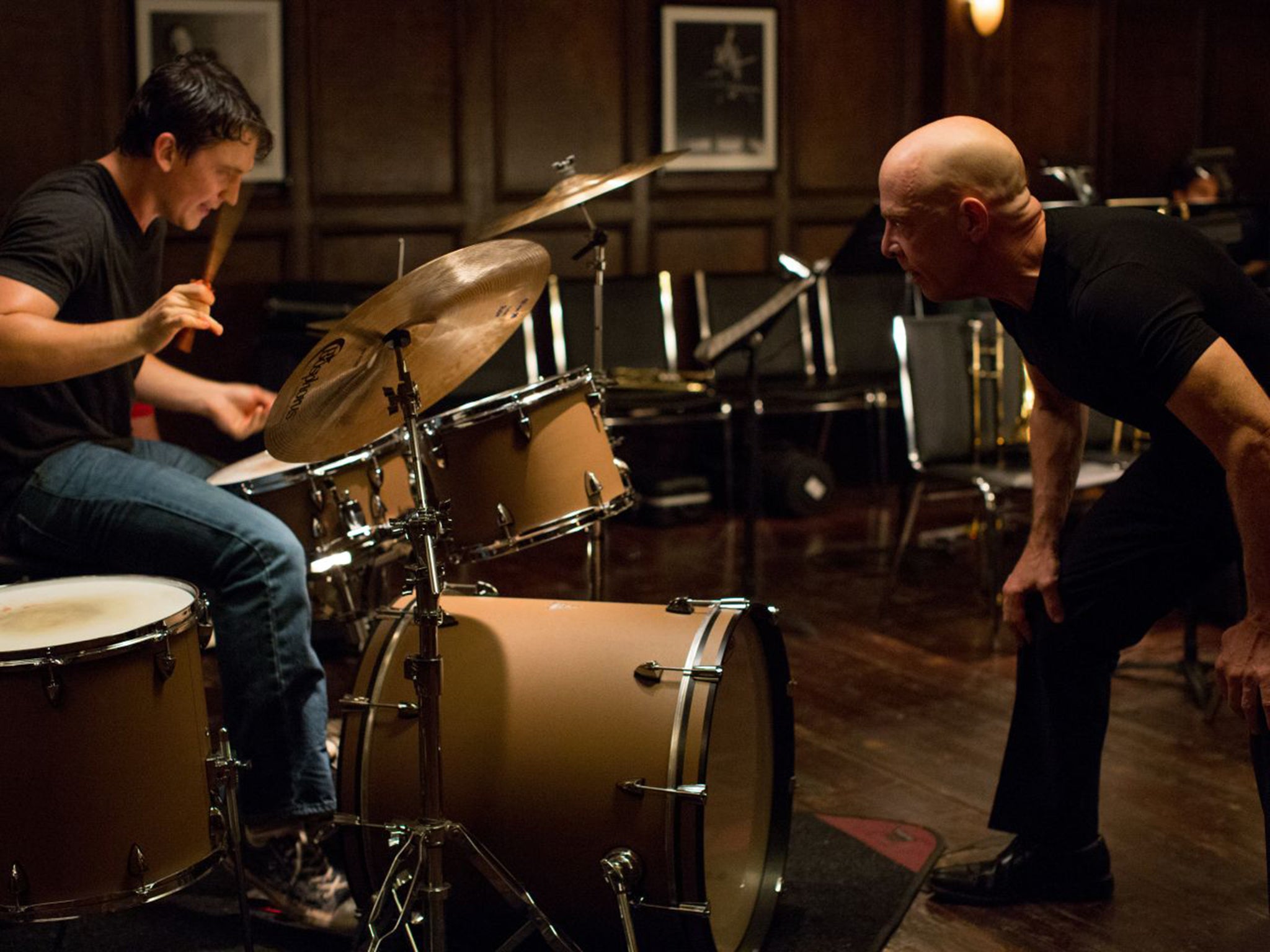Whiplash: the film that puts the drummer in the limelight, at last
Despite all the jokes, you can't have a good band with a bad drummer, says Phil Johnson

After years of being the butt of musicians' jokes (Q: How do you know a drummer's at the door? A: The knocking speeds up/He doesn't know when to come in), at last the figure in the shadows to occupy front and centre of the cultural stage, courtesy of the indie film Whiplash, which opens on Friday. In the movie, student-sticksman Andrew Neiman (Matt Teller) competes for a coveted drumming job in his music college big band, only to be terrorised by abusive band-tutor Terence Fletcher (J K Simmons, in bullying sergeant-major mode).
While Whiplash might use the competitive setting of a New York college jazz band as a metaphor for American society, it's also a film about a drummer, and there haven't been too many of those. Indeed, with a few notable exceptions – the Muppets' Animal, the mysteriously disappearing occupants of the Spinal Tap drum-stool, bland 1959 biopic The Gene Krupa Story, Ginger Baker in Beware of Mr Baker – the drummer has remained a curiously unexamined screen presence.
For despite all the jokes (Q: What's the first thing a drummer says when he moves to LA? A: "Do you want fries with that, sir?"), as every musician will tell you, you can't have a good band with a bad drummer. Without someone keeping the beat as it needs to be kept – and ideally, sounding tight and loose at the same time – everything falls apart.
Take Ringo Starr. (Q. Is Ringo the best drummer in the world? A: He's not even the best drummer in the Beatles.) One school of thought has him as the guy who got lucky when the Beatles tired of Pete Best's success with girls. But take away Ringo's carefully uncluttered rhythms and the Fab Four would never have sounded so right. The jazz-schooled Charlie Watts has been key to the sound of the Rolling Stones for 50 years, as vital as Ginger Baker to Cream, Keith Moon to The Who and John Bonham to Led Zeppelin.
What all these drummers have in common is a sense of swing: the seemingly effortless forward momentum provided by a slightly indeterminate (never simply metronomic) dancing groove. In Whiplash, swing and the lack of it – through "rushing" or "dragging" the beat – become Andrew Neiman's greatest challenge, apart from the challenge of Fletcher himself, whose casual racism, sexism and homophobia may conceal a heart of gold.
The concept of swing comes from jazz, where the role of the drummer has long had a talismanic significance. Elvin Jones with John Coltrane, and Philly Joe Jones and, later, Tony Williams with Miles Davis – all major influences on Watts, Baker, Moon and Bonham – might have sat at the back but what they played came way out front, creating a conversation of equals with the other instruments.
Jazz drummers also made a tradition of their own, each new contender vying to become "the man" while continuing to venerate those who came before. "There's Baby Dodds, Big Sidney Catlett, Kenny Clarke, Papa Jo Jones ..." the late Max Roach – the king of bebop drummers – once said. "You're free to pick and choose, but the concepts you pick and choose have to be as profound as those you learned from."
For many drummers, the weakness of Whiplash (there are nerdy complaints already about insufficiently tarnished skins or the size of a tom-tom) might be the hero's uncritical espousal of Buddy Rich (1917-1987), the overbearing big-band leader whose attention-seeking fills and solos were the antithesis to Max Roach's "feel" or Ringo's functionalism. For The New Yorker's Richard Brody, "Whiplash honours neither jazz nor cinema; it's a work of petty didacticism that shows off petty mastery, and it feeds the sort of minor celebrity that Andrew aspires to. Buddy Rich. Buddy fucking Rich." Ouch! No sooner has the drummer come out of the celluloid closet then they're trying to put him back in. (Q: What's the difference between a drummer and a savings bond? A: One will mature and make money.)
Of course, the reason for the jokes is jealousy, because almost everyone loves a drummer. Listen to the applause when the band's names are announced at the end of a show and it's always the drummer who gets the loudest cheer. (Q: How many drummers does it take to change a lightbulb? A: None. They have a machine to do that now.)
Subscribe to Independent Premium to bookmark this article
Want to bookmark your favourite articles and stories to read or reference later? Start your Independent Premium subscription today.

Join our commenting forum
Join thought-provoking conversations, follow other Independent readers and see their replies